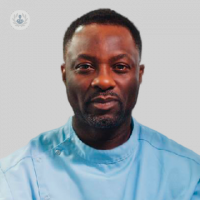When is a root canal necessary?
Written in association with:Root canals are necessary when the nerve or pulp of the tooth has become infected and inflamed due to a build-up of bacteria or an injury that has happened to the tooth. If your tooth is in pain, which ranges from mild to severe throughout the day and is sensitive to both hot food and liquids, it might be time for a root canal.
We’ve asked leading dentist, Dr Olurotimi Adesanya to explain what a root canal is exactly, what happens during the procedure, and whether there are any side effects from having the procedure.

What is a root canal?
The teeth have ‘roots’ that anchor them into the jawbone. Inside each of the teeth, there is a mixture of blood vessels and nerves called pulp. The pulp is inside a space called the pulp chamber, and this extends down into the roots of the tooth. The pulp chamber within the root is called the root canal.
What are signs that a root canal treatment may be necessary?
When the tooth is decayed, fractured or broken, bacteria and food debris can get into the pulp chamber and root canal. This can cause irritation of the nerve and blood vessel in the pulp chamber, which can then cause pain in the tooth and swelling around the tooth. When this happens, one is unable to eat with the tooth. The tooth will need a root canal treatment to prevent the tooth from being removed.
What happens during a root canal procedure?
A root canal requires one or more office visits, and can be performed by a dentist or endodontist. Your dentist will discuss who might be best suited to perform the work in your particular case.
The first step in the procedure is to take an X-ray to see the shape of the root canals and to determine if there are any signs of infection in a surrounding bone.
Local anaesthesia is used to numb the area near the tooth. The next step is to keep the area dry and free of saliva during treatment by using a rubber dam (a sheet of rubber), which is placed around the tooth.
An access hole will then be drilled into the tooth. The pulp along with bacteria, the decayed nerve tissue and related debris is removed from the tooth. The cleaning-out process is accomplished using root canal files.
A series of these files of increasing diameter are each subsequently placed into the access hole and worked down the full length of the tooth to scrape and scrub the sides of the root canals. Sodium hypochlorite is used periodically to flush away the debris.
Are there any side effects of having a root canal?
There are very few side effects of root canal treatment. There may be pain and slight swelling around the tooth that has been root treated, but this usually goes away after a few days. If this persists for more than three days, it may mean there is still an acute infection in the tooth and the dentist must be seen immediately.
What is the recovering time after having a root canal?
After the root canal treatment has been completed and the tooth is restored, it is expected that there should be no pain. However, in some cases, the tooth may not feel normal until about two to three days after the root treatment, which is the expected time it takes for the inflammation to be resolved.
If you require root canal treatment, do not hesitate to book an appointment with Dr Olurotimi Adesanya via his Top Doctors profile today.


